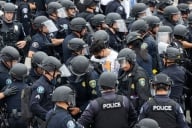You have /5 articles left.
Sign up for a free account or log in.
Small gatherings of students are sufficiently ubiquitous at some campuses that they fold into the background: a hum of hip-hop, a gentle rain of red cups, all easy enough for administrators to benignly ignore.
Yet the rare party rises from the group scrum of college hedonism to attain notoriety – and even a proper name. Events like State Patty’s Day at Penn State, Spring Fling at the University of Pennsylvania and the University of Michigan’s Hash Bash share some characteristics. The parties all take place annually in the spring, when the weather is warmer and seniors are preparing to depart. And they’ve all attracted concern from administrators, who worry that hundreds or thousands of people drenched in sweat, alcohol and other substances could leave some students – as well as the university’s reputation – injured.
But can you kill a legendary college party? Steven Leath, president of Iowa State University, is poised to find out.
Leath announced Thursday that Veishea, an annual student-organized spring festival that began in 1922, would end. A mix of alcohol-free events sponsored by Iowa State and alcohol-fueled events held off-campus, the weeklong celebration has in many years devolved into rioting. Veishea-related disturbances have been common since 1985, when celebrators flipped over and burned cars. Iowa State students and visitors have burned furniture in the street, hurled bottles and rocks at police, and torn down light poles, according to university documents. Since 1997, two people, both visitors, have died. One was stabbed; another fell from a balcony.
Here is video from a recent Veishea:
In 2005 the university canceled Veishea in response to a riot the year before. And this April Leath cut the festival short after a Tuesday night riot. Now, the university says, the celebration is gone for good.
The university is also leaving behind the term “Veishea,” which was originally an acronym listing Iowa State’s colleges, said Iowa State spokesman John McCarroll. The name itself has been corrupted. “It’s become apparent that the celebration was really becoming known for the late night disturbances, riots, and that’s really what people talk about,” McCarroll said.
Iowa State is not venturing into uncharted territory. Risky traditions take hold at many universities. And different institutions combat them in different ways. At the University of Colorado at Boulder, officials put an end to an annual 10,000-person April 20 smoke-out, an event never sponsored by the university where students and many non-students gathered to smoke pot, by closing the campus to outsiders – and by applying fishy-smelling fertilizer to the quad where students would congregate to smoke. Another public institution, the University of Wisconsin at Madison, dealt with a Veishea-like tradition by bringing the party on campus instead.
Boulder’s 4/20 smokefest began in the early 2000s, university spokesman Ryan Huff said. A few dozen students gathered on a quad and lit up – out of protest, ostensibly, but really for the fun of it. A few years later, the modest gathering evolved to a melee of more than 10,000 people on one of the university’s quads. Most came from outside the university.
“This was really an organic gathering of thousands of people in one area,” Huff said. “There was no organizer to pay for bathrooms, to pay for trash cleanup, to pay for all the event management type of costs.”
In 2012, the university decided things had gone too far. The throngs of people were disrupting classes and meetings, and officials feared the crowds could pose a public-safety issue. Boulder officials decided to close the campus to outsiders on April 20. Only students, faculty, staff and approved visitors would be able to enter the campus.
The move to shutter the campus was challenged in court, Huff said. The night before April 20, 2012, a judge upheld the university’s decision to close the campus.
The tactic worked, Huff said. Although a few hundred students gathered, the crowd was a sliver of what the university had seen the year before. And in 2013 and 2014, the 4/20 celebration had all but disappeared.
The University of Wisconsin at Madison was also home to a celebration whose political roots had since been abandoned. Madison’s Mifflin Street Block Party started as a street protest against the Vietnam War.
“As legend goes, there was much more smoking marijuana and talking academically about why are we in war, what does war do,” said Lori Berquam, Madison’s vice provost for student life and dean of students. “Our current mayor, the mayor of Madison, was one of the early participants.”
In the late 1990s, the pacifist party grew destructive. “There were cars overturned,” Berquam said. “Couches set on fire.”
The rioting claimed victims. In the early 2000s a student fell from a balcony and died, Berquam said. And in 2011 a visitor stabbed a university student. Allegations of sexual assault related to the celebration also surfaced.
These incidents – the balcony death, the stabbing, the riots – bring to mind many of the problems Iowa State experienced with its own spring festival.
The celebration’s violence left some students shaken, Berquam said. They began to develop a new spring festival. In 2013 Madison’s student union hosted the Revelry Music and Arts Festival. In 2014 the daylong festival attracted more than 7,000 people, Berquam said. Although a few houses on Mifflin Street still host parties, what once was a dominant tradition has subsided.
“Students really initiated this,” Berquam said. “It’s really about the effort of the students to say, a degree from the University of Wisconsin Madison means more than a party.”
Iowa State is exploring other ways to celebrate, but is moving cautiously. “There may come a time when we want to have other kinds of more limited – not a weeklong, comprehensive – celebration,” McCarroll said. He said the university was not looking for a single celebration to replace Veishea.
Iowa State has control only over the official parts of Veishea – the on-campus, alcohol-free events.
“The critics have said, why cancel the official celebration to punish a relatively small group of people responsible for a riot?” McCarroll said. “The only thing the university controls is the official event. That’s what’s connected to Iowa state university. I think a lot of people feel the president had very little choice at this point.”
Universities that wish to reform risky traditions, however, must work closely with students – otherwise the party will just go underground, Berquam said.
“It really depends on a partnership,” she said. “Students need to understand this is really dangerous for them.”
David Hardesty, the former president of West Virginia University, said a substitute event – as well as close work with student government – proved critical in the university’s efforts to eliminate the Grant Street Block Party, which had by the 1990s become a risky tradition.
“A consensus had to be reached that the block party was dangerous and had to be done away with,” Hardesty said. “Student government was part of the solution. We created an alternative event called Fallfest.”
Putting a substitute event on the table “was the primary strategy,” he said. “Just saying ‘don’t do it’ after it’s a tradition of 10 years is very difficult,” the former president said.
Caldwell Miller, a rising Iowa State senior, told the Des Moines Register that he was disappointed about Veishea ending. But he directed his exasperation not at the university's president, but at the students who'd let things get out of hand.
"I'm just kind of disappointed, I guess, that that's how Veishea had to end," he said. "You know, I mean, the few people kind of got to ruin it for everybody."








